#flashbacks to a time sam was young/ the age of the version(s) of himself that he meets time travelling
Explore tagged Tumblr posts
Text
Me realizing the flashbacks in the renegade are actually flash forwards in would-be linear time and only flashbacks in terms of how they pertain to apocalypse!Sam's future-past (past future?).
I love time travel.
#the renegade#one of my keywords/aesthetic words for the fic was 'flashbacks'#which i realized could be confusing because it could just as easily mean#flashbacks to a time sam was young/ the age of the version(s) of himself that he meets time travelling#but no they're all flash forwards to the future he hurtles/is hurtled from#anyway can you tell I'm tired today this did not need to be a post but my brain is sleepy
1 note
·
View note
Note
i noticed that in a past post you had mentioned daffy was in the front lines of world war 2. how was that like? how did toons particularly handle war?
Not particularly well. Toons are not designed for war, they're designed to make people laugh. Added to that that most of the toons were very young [under 15] when they were sent to the front and the story gets sadder.
Warnings: Mention of War and descriptions of PTSD [I have done research, but this is Toon version, so it's not going to tally exactly with humans]
Disclaimer - this is a headcanon. I have mentioned the companies here and Walt Disney [briefly] stating the obvious, it's all made-up.
All of the companies involved did there best to help/protect the toons as best they could. None of the female or children toons were allowed to go and there was a limit on how old the 'adult' toons had to be before they could go. That ended up being 5. The companies wanted 10, the Military wanted three, five was a compromise - although the companies had to fight hard to get that. In the end it boiled down to 'Either five, or they don't go at all'. The companies also re-negotiated the initial year the toons would be away down to 6 consecutive months. The companies wanted three months, so it was another compromise.
Stating the obvious, none of the toons enjoyed it much. Even the ones who thought they would thrive [Like Donald, Yosamite Sam and other 'tough' toons] found it difficult. Not to say they don't remember some bits of it fondly, mainly the comradeship they found, but for the most part it was hell on earth. After the first lot of Toons who's gone in the first month [about 30, mainly background toons, Prince Florian and Sylvester] came back from the front they looked so pale and ghostlike [visually, a shell of there former selves] that none of the others wanted to go and the companies tried to pull them out of it. [This being near the end of 1943] But they weren't allowed to, so the toons had to go.
The time the toons were fighting was 'only' Jan 1943 - end of war, Sep 1945, and the toons were only there for 6 months, but it was a long, terrifying 6 months.
The weird thing was that after the first initial couple of months while there coulor came back and they looked more life-like again, they seemed okay. Really! They could still act - and act well - they joked with each other in a normal manner and they talked to people. Sure, there were a few of them showing more difficulties adjusting - like Daffy who was acting paranoid and was constantly on the edge and Donald who's already-existing anger issues went through the roof, not to mention Elmer who was mute for a few months after coming back and Pete [Disney] who locked himself away and wouldn't come out, not to mention the at least 30 of background toons who were all showing extreme level of difficultly, but, hey, that was only a couple of toons, right? In the grand scheme of things. The rest of them were fine.
They were not fine.
It took a good couple of years [between 5-10] But eventually the cracks started showing. The Toons who had fought in the war started reacting weirdly to loud noise. Jumping onto the ceiling and refusing to come down, hiding under things and in things [like jugs and cups and cracks in the wall] whenever they thought they were under attack. They were having frequent, intense nightmares and a lot of the toon were displaying mental health issues like paranoia and splitting themselves in two [literally. It depended on the toon as to what exactly the personalities looked like, but as a general guide they'd be one 'young' one from around the time they were first created and another one that was closer to there normal age, but looked and acted completely different. Doctor Scratchesniff theorised it's what the toons worse fears about themselves are, visualised and brought to life.]
The toons were also having flashbacks to the war, which is bad enough on its own, but because they're toons the flashbacks literally engulfed them and whoever was near, drawing them into a world that they hadn't been in for about five-ten years. This, as you can probably imagine, was quite a major problem so the three major studios - Disney, Warner Bros's and Hanna-Barbera - put there heads together and came up with a solution, and that solution came in the form of Doctor Scratchensniff. [I do have a separate headcanon on him, covered in my 'Mental-Health' headcanon] The idea was that D.S. would work across all three studios and have enhanced toon powers.
While it's well known that a lot of Toons have been affected by the war, I'll go through a few of the toons that [I headcanon] have had the most noticeable difficulties after the war.
Daffy - He now goes back and forth between his 40's characterisation [screwball, Clampett version] and his greedy-jerkass characterisation in later years. The way it works is he will be the 'sensible' persona of the Greedy Daffy for most of the year [who, for all his faults, does care about his friends/family and can take care of Plucky easily], then he will suddenly switch back to his 40's persona. [Who, although he does still care for his friends/family, he can't express it as well and he has NO IDEA who Plucky is.]
After a bit of help and counselling from D.S. he has identified his major triggers [and Daffy has informed the rest of the LT's so they're aware of them]. For example, flying a plane will instantly put him back in the 40's mindset. For a time it was flying in general that put him in the mindset [which was fun when the LT's went to Australia] but now Daffy's okay with it and can manage small journeys easily. Longer journeys he struggled with, but he simply doesn't go on long plane journeys.
He also doesn't like Toons taller than himself getting in his face, [much taller, I mean. Bugs is alright.] He'll go into 'Fight' mode and try to attack them. Non-expected loud sounds like a car backfiring or fireworks can also remind him of war. Daffy's reaction when he hears something that he's not sure of what it is, it to try and find it and attack it. Either that or he would teleport away to a small space [like a jug, under a staircase or a crack in the wall] and not come out until Avery/Elmer/Porky calmed him down. [Bugs does try, but Daffy tends to get more wound up whenever Bugs tries anything, so the rabbit had to stop.]
Donald - I'm not going to spend long on Donald, mainly because his issues have [I'm fairly certain] been touched on in canon? His triggers are a lot like Daffy's except that Donald is MUCH more likely to try and attack anything he thinks is a threat rather than run away from it. He has inadvertently hurt [both physically and mentally] people he cares about by doing this, but they understand the reason why. Doesn't necessary make it easier, but they understand.
The main difference between him and Daffy though is that Donald has always wanted help. Ever since he realised he was hurting the people he loved, he wanted help. He had time off from work, Scrooge stepped in and insisted Donald and the boys move in with him so he didn't have to worry about a roof over his head and getting food and stuff. [Unfortunately this genuine well-meant, kind act only added to Donald's general feeling of uselessness]
The good news was that not only did Donald have extended family support, but he was best friends with Mickey and Goofy. Mickey was able to lean in Walts ears and convince him to treat Donald more leniently than he might have other toons, he also did his best to help Donald come to terms with what had happened to him during the war. Goofy could - in theory - do a lot less than Mickey, but he WAS more available and completely willing to take the boys off him for a couple of hours/days/weeks if needed. Goofy can cook - and cook well - so he'd bring food over for Donald so that if [as happened often] he didn't feel like cooking he'd have something ready to heat up/put in the oven.
Elmer - Some of the toons when they were put in charge of there units got on quite well, in that they had men who were willing to listen to them, and treated them kindly. Elmer's troop wasn't like that. He was very young when he was sent there [8] and was still more like Egghead. A bit silly, a bit hyper and not as hard as he needed to be. He cried the first time he went into battle and had a lot of trouble trying to gain the respect of his men. This has had a knock-on effect in that he thought everyone around him hated him and didn't like him. Even when he went back to Toontown, he just thought all his friends/family were being nice to him because they had to, not because they genuinely liked him.
Over many years Elmer has come to accept this isn't true and has been in therapy with D.S. in order to discuss it further. On a different note the main immediately noticeable difference upon coming back from war [aside from the fact he was mute for about two months] was that he started sleepwalking. His sleep had never been great at the best of times, but the war gave him such bad nightmares that he hardly ever slept. When he did eventually get to sleep, he started sleepwalking. Elmer being Elmer somehow didn't notice this at first? He thought it was completely normal [?] to start the night in your bed and wake up in Toon-World Australia having somehow swam his way across the ocean and hacked his way through the Australian outbacks to the middle off Australia, while asleep. He then had to spend several days trying to get back to Looney-Tune Street. With this in mind, it was really only a matter of time until it was noticed by the others.
They do there best to look out for him, if one of the LT's see Elmer sleepwalking, they will follow him/go with him and try to look after him. It should be noted though that despite the fact Fudd is clearly asleep, he is somehow aware of his surroundings and should someone attack him he will fight back and, most times, win.
#Looney Tunes Ask#Looney Tunes#Donald Duck#Daffy Duck#Elmer Fudd#Yosemite Sam#Headcanons#Mickey Mouse#Goofy#Disney Headcanons#Looney Tunes Headcanons#PTSD#Scrooge McDuck
34 notes
·
View notes
Text
Reflecting on Superman and Lois season 1
Now that the season is over, its interesting to look back at a very stop start season. Its very difficult for a show to hold your interest with the type of scheduling problems this show had, and in its very first season. When the show was announced, I wasn't terribly surprised but I was also not overly excited. There has been a lot of Superman and Superman adjacent material that has come out before and after the announcement so I did wonder about what they could do new. In addition, while I certainly liked Tyler in his guest appearances in Supergirl, in Elseworlds, and in Crisis, he did feel like the inferior Superman in Crisis when he was opposite Brandon Routh's Superman who really looked and felt like Superman, even better than he did in Superman Returns. However, once the trailer dropped, I was sold. It was clear that the show was going for something a lot more cinematic and a lot more grounded than the previous Arrowverse shows. I did have some apprehensiveness over the teenage boys angle because teenagers can become very stereotypically irritating in shows and given that a good chunk of time was going to be dedicated to them, it was going to be vital for them not be so.
Having finished the season, I have to say that the execs and the writers have pulled off an excellent first season. I don't think I would call it the best season 1 in the Arrowverse. I still love The Flash season 1 over any other Arrowverse season and while I haven't seen it in a while, I love Arrow season 1 as well. This may come at 2nd or 3rd place based on further reflection. I do think its has some issues when it comes to the villain storyline and with the big action set pieces, but the film's heart is set at the right place and the characters are all very likable and you want to see conversations between the characters. That's when you know that the writers are doing a good job when you almost feel that the show should go back to the character moments.
Firstly, the idea of a matured Superman is what works wonderfully well. There is something wonderful about seeing Clark and Lois as a couple who have known and loved each other for over a decade. Closer to two decades I guess. Characters don't quite look their age tbh. Lois would have to be in her early 40's at least. But I can honestly overlook that. Bitsie and Tyler were already a very likable couple in Elseworlds and the show has just used that natural chemistry to brilliant effect. But the big relief was that Jordan Elsass and Alex Garfin are excellent as Jonathan and Jordan. I was initially a little worried that Jordan could be a little much, but both of them were excellent and one of the highlights of the season was the bond between the two brothers. Jordan and Jonathan have conflicts but they are brothers and they love and support each other unconditionally.
Jonathan could have so easily been the douchey, jealous brother but Elsass is honestly one of the mvp's of the season. You really care for Jonathan, even though he arguably has a slightly less meaty role in the story. I think Bitsie Tulloch is outstanding all season. She has shot up very high among all my favorite Lois Lanes. She's very different from the other versions and that makes her stand out. One of my favorite episodes was episode 8, which deals with Lois dealing with memories of her miscarriage along with almost losing Jonathan. She is excellent in that episode as is Elsass. Tyler is wonderful throughout. He's a strong Superman but his Clark is even more endearing. Little things like him being so psyched for the Harvest Festival, how he plays young Clark in flashbacks as someone distinctly different, him meeting Lois and working with her for the first time, the adorable "my mom made it" moment when Superman first saves a kid etc... He just embodies everything you know and love from the character. Wole Parks is another terrific addition. Initially you think he's an alternate version of Lex Luthor but it was genius idea to have him actually be John Henry Irons. There was something innately likable about him even when he was fighting Superman and we thought he was Lex. I loved how they handled the dynamic of being Lois' husband in another world and having a daughter. It makes for an interesting dynamic but it never gets into problematic territory because he is mature enough to know that this Lois isn't his Lois, but they also show his difficulty in dealing with that. I liked the bond he seemed to be forming with Jonathan. And I liked how he came along to be an ally with Superman.
The Cushings are ok. They play an important part in the season with Sarah Cushing being Jordan's love interest and Kyle being a big part of the how the villain story begins, with Lana also being a major character in the story. All three actors are excellent but Kyle does have the stereotypical doucheyness which was a little annoying for the first 10 episodes, however he does redeem himself in the final arc. I hope Lana gets to be a bit more active in the show because she does feel like a bit passive as a character. However, I did find that Sarah and Jordan romance actually pretty cute. Both actors did a nice job making them feel like awkward teenagers, dancing around their feelings for each other. Sam Lane is another character who starts out pretty unlikable but I warmed up to him by the end.
Where I think the show doesn't really work at full strength is the superheroic aspect of the show. The character drama in the show is great. I think it works gangbusters. The superhero plot of it all is a little meh. While Adam Rayner is perfectly fine as Edge/Tal-Rho, as a character he's just not that interesting. There is an interesting perspective there that he's sort of a mirror image to Clark where he got mistreated by people when he landed on Earth and that is how his worldview shaped that way, and he longed for family, but there isn't enough done on a character level with him. As a result, the last third of the season was a little iffy. The whole, build Krypton on Earth felt like a variation of Zod's plot in Man of Steel. The method is different but the eventual outcome is the same. I also don't know why all Kryptonians, apart from Lara, are homicidal maniacs, when they are said to be a peaceful race. The arc also becomes repetitive because there are like three climaxes. And I feel the finale was the weakest climax of the lot. Episode 10 or 12 would have served as better finales with a little tweaking. If I remember correctly, the original order was for 13 episodes and it got extended to 15, so this might be an explanation to why it feels this way. The action is fairly by the numbers. While it looks like there is clearly more money on display here than say for Supergirl or The Flash, the action scenes aren't particularly exciting or inventive.
While I am not super high on the finale, I am mostly happy with how things wrapped up. I think they should have had Tal-Rho die tragically because I really don't think he's interesting enough to be brought back again. The arrival of Natalie Irons will surely be a source of some emotionally charged scenes. i hope there is some character bonding between the her and the brothers. Jonathan seemed pretty interested in meeting her when he saw videos of her. I do wonder how the show will continue to incorporate Smallville as a setting. Season 1 obviously had a very specific plot based reason to be in Smallville, given Edge's plot was based in Smallville. But I can't imagine every big bad will have Smallville based plot. But the characters are all settled in Smallville, with the Cushings and Lois buy half the Gazette and running it with Christy. So that's going to be an interesting balancing act that they have to do. I hope they can bring in some traditional superheroics as well because Superman rogues gallery is rich enough. Out of the episodes, I think 6-8 were my favorites, and the flashbacks in episode 11 were incredibly charming. While the season is not flawless I don't think it completely nailed the superheroic heights that it was aiming for, it was a really entertaining season of tv. An 8/10 for me.
#superman and lois#lois lane#clark kent#superman#jonathan kent#jordan kent#lana lang#sam lane#john henry irons#tyler hoechlin#bitsie tulloch#elizabeth tulloch#jordan elsass#alex garfin#wole parks#adam rayner#emanuelle chriqui#dylan walsh#erik valdez#kyle cushing#sarah cushing#inde navarrette#morgan edge#tal rho#superman & lois
9 notes
·
View notes
Text
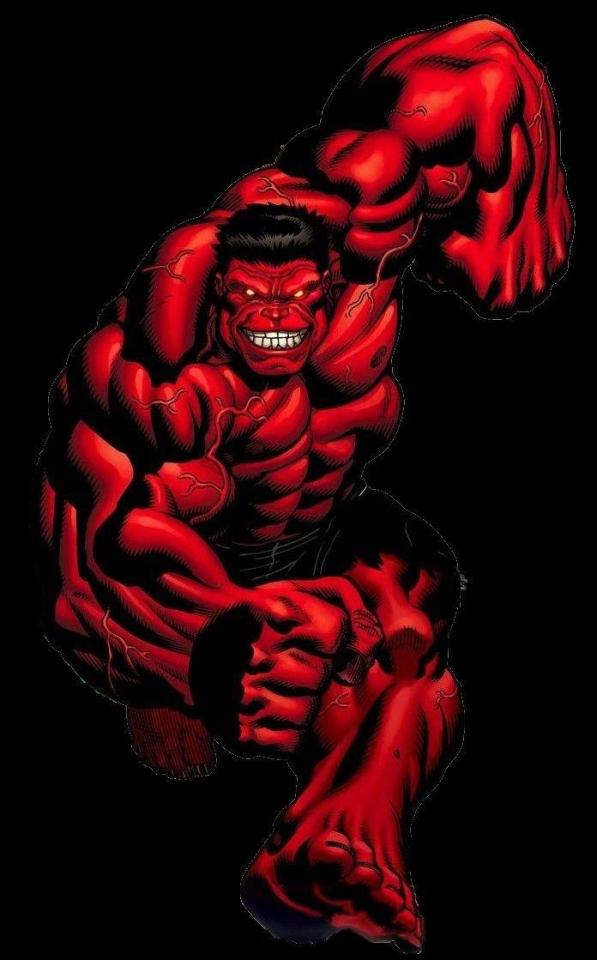
Ross grew up in a military environment with both his father and paternal grandfather in the military.[4]
Ross is the Air Force general in charge of Bruce Banner's gamma bomb project. His daughter, Betty, takes a liking to the young scientist, deepening Ross' dislike for the "weakling". After Banner's transformation into the Hulk, Ross spends years chasing the monster, becoming obsessed enough to commit treason by allying himself with the Leader, MODOK, and the Abomination[5] to destroy the Hulk. Dismissed from the military, he shows up at Betty and Bruce's wedding with a gun and shoots Rick Jones. He is recruited by S.H.I.E.L.D. agent Clay Quartermain to merge with the electric creature Zzzax, a process that gives Ross superpowers but also makes him mentally unstable. He is later restored to human form but retains some residual energy-generating powers.[6]
Finally, the Nevermind, a mutant who drains people of their life energy, attacks Gamma Base in search of a strong host, in this case the Hulk. After witnessing Banner and Rick Jones (who was the Hulk at that time) heroically engaging the mutant, Ross realizes that he has been wrong about the Hulk being a mindless monster. He saves his daughter by allowing the mutant to latch on him and discharging the energy resources he retained from Zzzax. Giving his blessing to Bruce and Betty, he dies in his daughter's arms.[7]
Ross' body is later stolen by the Leader, who uses the powers of one of his followers to resurrect Ross. He turns him into a mindless replacement for his fallen soldier Redeemer. Ross is eventually recovered and revived by agents of the alien Troyjan and returns to the Air Force. He later comes up with a more cost-effective method of confronting the Hulk when he is in his childlike stage: active non-resistance. He and his men simply do not fire on or engage the Hulk in any way. The Hulk, confused, does not smash and leaps away.[volume & issue needed]
Ross would make friends with Banner, but when Betty is seemingly killed due to what both Ross and Banner believed to have been Banner's gamma-irradiated DNA interacting with hers, he once more pursues the Hulk with a vendetta.[volume & issue needed]
Around this time, General Ryker takes over the pursuit of the Hulk. Ross is indirectly involved, observing when Ryker mentally tortures Banner to try to figure out how the Hulk works. The Hulk escapes from Ryker's control and, after several adventures, is lost in space.[volume & issue needed]
After the Hulk returns from exile and initiates "World War Hulk", General Ross, now a full general, makes his own return, electing to bring the fight to his nemesis once more after the Hulk beats Iron Man. After a failed assault on the Hulk, Ross and his men are captured and placed in chains under the watch of Hulk's Warbound, the army he has brought back from space. The Hulk is eventually defeated via satellite weapons that revert him to human form.[8]
Military branchEdit
Ross' military affiliation has been inconsistently portrayed in the comics. Many early Hulk stories depicted Ross as an Army general trying to capture or destroy the Hulk with a U.S. Army battalion called the "Hulkbusters". However, he is also frequently seen in an Air Force uniform, as in his first appearance in Incredible Hulk #1. Stories about his service during World War II portray him as an Army officer in the U.S. Army Air Corps, as the Air Force was not a separate branch of the Armed Forces until September 18, 1947. In a November 2010 Q&A column, then-Marvel editor-in-chief Joe Quesada clarified that Ross is a member of the U.S. Air Force and that inconsistencies in his uniform can be explained via the artistic license with which artists attempt to present a more dramatic-looking uniform, and that Ross may be a part of a special unit of the U.S. Air Force, or the Marvel Universe's version of it, which has its own unique dress code.[9]
The Army continuity is also followed in various Hulk adaptations, such as in the 1966 and 1996–1998 cartoon versions of the Hulk, the 2003 Ang Lee movie Hulk in which he is portrayed by Sam Elliott, and in the 2008 movie The Incredible Hulk, in which he is portrayed by William Hurt. The Official Handbook of the Marvel Universe: Hulk 2004 issue officially indicates Ross to be a three-star lieutenant general in the U.S. Air Force.
Red HulkEdit

Red Hulk as seen on the cover of Hulk vol. 2 #1 (January 2008). Art by Ed McGuinness.
Red Hulk (also known as Rulk[10] or The IncREDible Hulk) was introduced in 2008 in Hulk #1.[11] The Red Hulk was created to be an uninhibited, tactically intelligent adversary to the Hulk.[12][13] Although Kenneth Johnson, the creator of the 1970s TV series The Incredible Hulk, had suggested a red Hulk for that adaptation decades earlier,[14] Marvel editor-in-chief Joe Quesada proposed the idea for the comics to debut a red version of the character whose human identity was a secret.[15] Initially, Red Hulk's identity was unknown both to the characters in the story[16] and to the reading audience.[17]
The opening story arc of the Hulk series that premiered in 2008 established that the Red Hulk is very aggressive, as he murders the Hulk adversaries Wendigo and Abomination; destroys the Helicarrier of the spy organization S.H.I.E.L.D.; defeats several Marvel heroes; and, after causing an earthquake in San Francisco, is finally defeated by the combined efforts of the Hulk and Thor. In a subsequent storyline, the Collector places the character with other villains on a team called the Offenders, an evil version of the Defenders, in a bid to prevent the original Hulk from reuniting with Jarella.[18] In that story Red Hulk siphons the Power Cosmic from the Silver Surfer, seemingly killing him, steals his board along with Terrax' cosmic axe, and uses the power to go on a killing spree, killing Namor, Tiger Shark, Dr. Strange, Baron Mordo, the Grandmaster, Terrax, a time-displaced Hulk, and Psycho Man. However, when Red Hulk reveals this to Galactus, Galactus swiftly takes back the Power Cosmic from him. Subsequently, almost everyone he killed is brought back to life with no memory of the event.[19]
The Red Hulk was created as part of a Super Soldier program by persons including Doc Samson,[20] and the criminal think tank Intelligencia,[21] headed by MODOK.[22] The 2009 "Code Red" story arc[16] also made allusions to Red Hulk's real identity, and introduced a Red She-Hulk character, when Domino identifies Red Hulk before his transformation.[23]
In the 2010 storyline "Fall of the Hulks: Gamma", Red Hulk is related in flashback to have killed General Ross at the behest of Bruce Banner, with whom he has formed an alliance.[24] However, the 2010 "World War Hulks" storyline reveals that Red Hulk is Thunderbolt Ross himself, the Red She-Hulk his daughter Betty, and that the Ross who was "killed" was a Life Model Decoy used to convince the world that he had died. Red Hulk then thwarts the Intelligencia's plan to take over the United States with a Life Model Decoy of Glenn Talbot by destroying the Talbot LMD and attempts to take over the country himself.[8] He is thwarted by a restored Hulk, who beats Red Hulk mostly due to Red Hulk's exhaustion from overheating. Hulk tells Red Hulk that it was his idea to fake Ross' death and that he can never again resume that identity. After imprisoning Red Hulk in the Gamma Base, Banner makes arrangements with Steve Rogers for Red Hulk to join the Avengers.[25][26]
After Steve Rogers recruits Red Hulk, Red Hulk manages to stop Intelligencia's failsafe plan "Scorched Earth". Although Banner had claimed that he removed Red Hulk's energy-draining ability from him because it was killing Red Hulk, Red Hulk is shown to still possess this ability.[27] After the events of the Scorched Earth program, Red Hulk is paired up with a Life Model Decoy named Annie. Red Hulk is occasionally assaulted by Ross' former protégé General Reginald Fortean, a scientist given superhuman mutations by MODOK named Zero/One, and the Indian serial killer Black Fog .[28]
Red Hulk plays a vital role in the Infinity Gem crisis of the "Heroic Age" storyline.[29] During the 2011 "Fear Itself" storyline, Red Hulk attempts unsuccessfully to stop the Thing (in the form of Angrir, Breaker of Souls) from destroying the Avengers Tower,[30] as MODOK Superior and Black Fog converge on both combatants during the fight. Angrir dispatches Red Hulk by knocking him out of the city and into Vermont.[31]
As part of the 2012 Marvel NOW! relaunch, Red Hulk leads a non-government sponsored version of the Thunderbolts.[3] This incarnation is a strike team that cleans up the messes left by Ross' military career, but the team later decides on a new arrangement in which the team will do one mission for Ross, then a mission for a random member.[citation needed]
After Hulk takes away the powers of Rick Jones, Skaar and Betty Ross, Ross starts monitoring Hulk's movements. This leads to a battle in which Doc Green subdues Red Hulk and injects him with a formula that reverts him to Ross. The Army is alerted to the confrontation. When they arrive, the Army arrests Ross for deserting his country.[32]
The 2016 "Civil War II" storyline reveals that Thunderbolt Ross is incarcerated in a classified military prison.[33]
In 2018's Free Comic Book Day Captain America issue indicates that Ross is no longer incarcerated.[34] Subsequently, in that year's Captain America #1, it is revealed that Ross was paroled for helping a resistance cell during the "Secret Empire" storyline and appointed head of the investigation into the attack.[35] However, he was later killed, and Captain America was framed for his murder.[
4 notes
·
View notes
Text
A Year in Review: The 31 Best Episodes of TV of 2019
There's never been more TV than this year. Thanks to the launch of new streaming services like Apple TV+ and Disney+ (with more to come in 2020!), there is an infinite number of hours of content out there. And while not all those TV shows are worth a watch, mot seasons of shows genuinely contain at least one great-to-amazing episode. The 31 episodes listed below are the ones that stood out the most; that either became part of the cultural conversation or were not well-watched but still resonated in a way that deserved more attention. Whether it was the writing, the acting, a visual moment or a hilarious scene, these selected episodes rose above the cut to show what TV can do in this unprecedented era.
31. “Striking Vipers,” Black Mirror Season 5, Netflix

30. “Smell Ya Later,” Killing Eve Season 2, BBC America

29. “Chase Gets the Gays,” The Other Two Season 1, Comedy Central
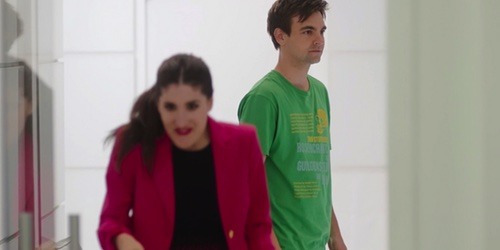
28. “Refugees,” Ramy Season 1, Hulu
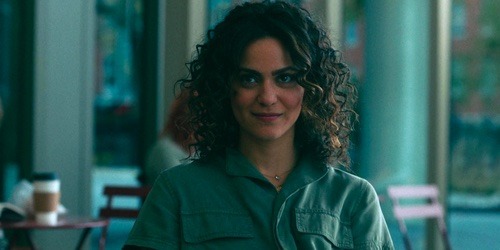
27. “Finish It,” The Deuce Season 3, HBO

26. “Chapter 7: The Reckoning,” The Mandalorian Season 1, Disney+
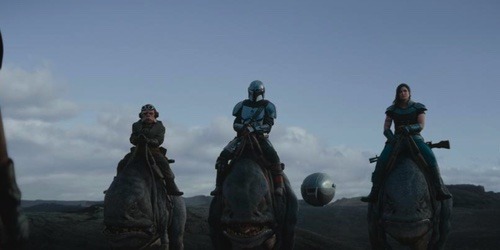
25. “Life’s a Beach,” Pose Season 2, FX
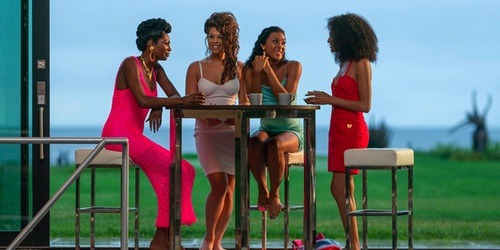
24. “Easter,” Better Things Season 3, FX
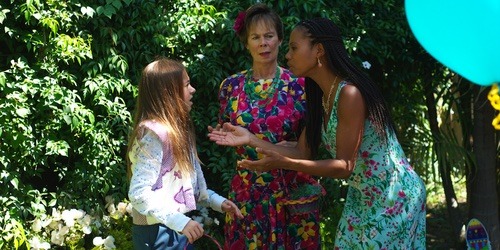
23. “Chapter 8: Overview,” The OA Season 2, Netflix

22. “Reborn,” Servant Season 1, Apple TV+
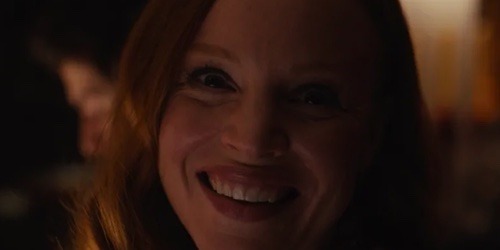
21. “Stories,” Broad City Season 5, Comedy Central
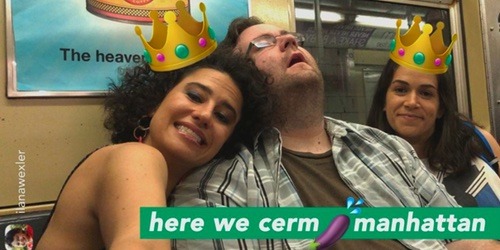
20. “Blondie,” High Maintenance Season 3, HBO
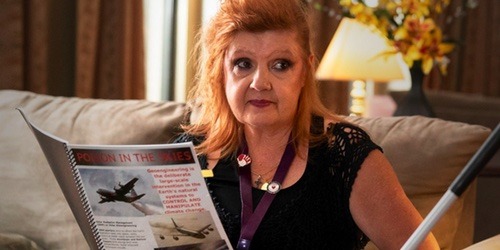
19. “The Trials and Tribulations of Trying to Pee While Depressed,” Euphoria Season 1, HBO
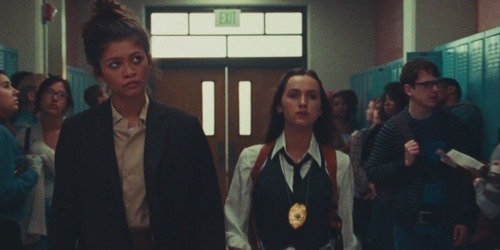
18. “The Bad Mother,” Big Little Lies Season 2, HBO
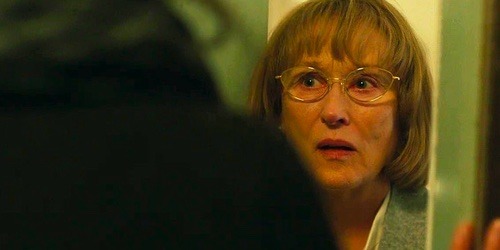
17. “405 Method Not Allowed,” Mr. Robot Season 4, USA
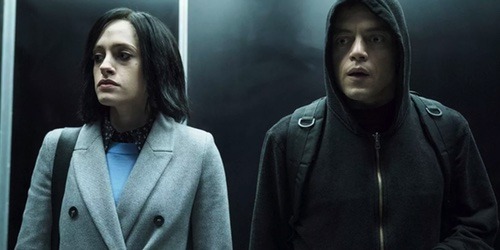
16. “1:23:45,” Chernobyl Season 1 HBO
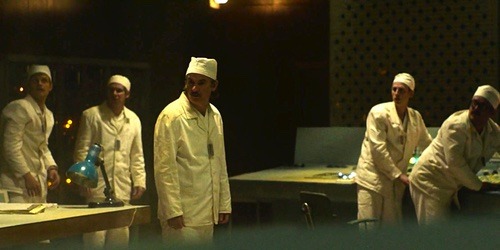
15. “Dundee,” Succession Season 2, HBO
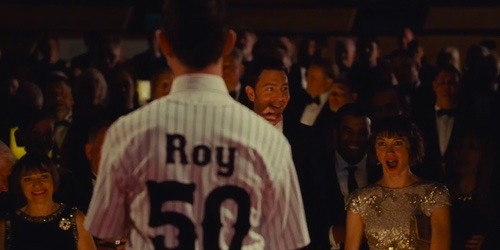
14. “Episode 9,” Mindhunter Season 2, Netflix

13. “401 Unauthorized,” Mr. Robot Season 4, USA

12. “Take Me as I Am, Whoever I Am,” Modern Love Season 1, Amazon

11. “Part Four,” When They See Us Season 1, Netflix
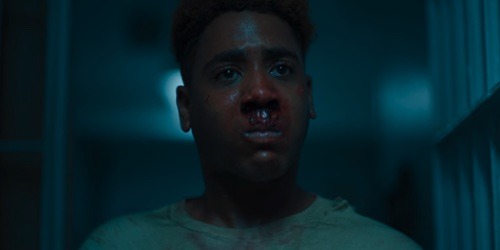
Ava DuVernay's achingly painful "When They See Us" miniseries about the persecution of the Central Park 5 is capped off with its brilliant final episode; a showcase for Jharrel Jerome ("Moonlight") who undergoes a transformation here unlike any other actor on TV this year. Playing Korey Wise, we see Jerome go from happy-go-lucky New Yorker to a victim of the vicious prison system who is beholden to his truth despite its consequences. It is a harrowing 88 minutes of TV that is both devastating and beautiful, carried on the shoulders of Jerome's unparalleled performance.
10. “A God Walks Into a Bar,” Watchmen Season 1, HBO
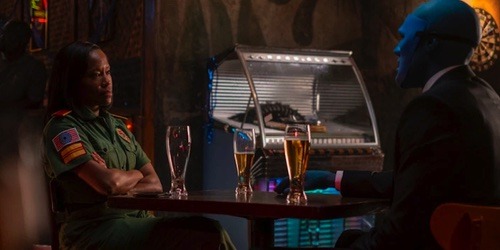
The penultimate episode of "Watchmen," the buzziest show of the fall, is the most Damon Lindelof has been during this stellar season of TV. "A God Walks into a Bar" is a revealing episode in the same way as the last season of "The Leftovers," Lindelof's previous project. The episode reveals that for all of its surrealness and commentary about race and gender in our world, the "remix" of the popular comic book series is, at its core, a love story. Lindelof sets the episode as a classic cosmic joke but as it goes on, it exposes itself to be full of heart and emotion; about two people from different parts of the universe (and different parts of the space-time continuum?) connecting. At a bar. Over beer, conversation, and eggs.
09. “Strawberries,” Ramy Season 1, Hulu
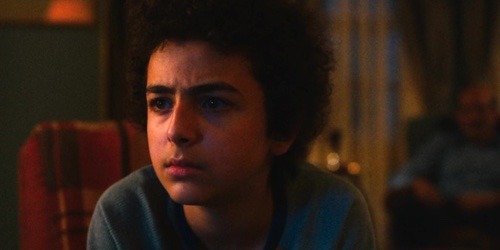
Unlike anything depicted on TV, "Strawberries," the peak of Hulu's comedy "Ramy," created by standup Ramy Youssef, is told in flashback, tracking a young Ramy in the days leading up to and after 9/11. Seeing the event play out from the perspective of a young Muslim child in middle school is heartbreaking and raw; a highlight that is thoughtful, meditative, funny and surprising.
08. "Shook One Pt. II,” Euphoria Season 1, HBO
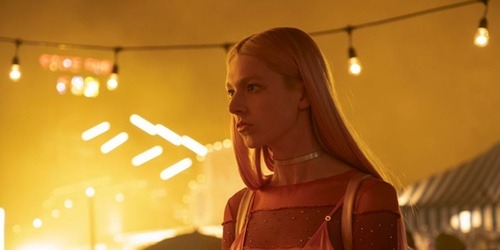
It's not until "Shook One Pt. II" that "Euphoria" finally clicks and finds its groove. Playing out at a carnival, the episode raises the dramatic stakes for the show's young cast, where creator Sam Levinson's bold aesthetic choices complement the intense tension on display. Part thriller, part romance and all edge, this episode of "Euphoria" features stellar performances from Zendaya, Hunter Schafer, Jacob Elordi and more.
07. “Volume 7: The Magician" + "Volume 8: The Hanged Man,” Too Old to Die Young Season 1 Amazon

It was hard to pick just one episode of Nicolas Winding Refn's twisted noir cop saga "Too Old to Die Young." The controversial auteur made a perfect thing for streaming age; somewhere between a film and a series. NWR said himself that you can watch the episodes out of order, or start from anywhere, which is sort of true. But it's the back-to-back episodes towards the back half of the series, "Volume 7: The Magician" and "Volume 8: The Hanged Man," that stand out the most; a chaotic and insane set of events that turn "TOTDY" on its head.
06. “Posh,” PEN15 Season 1, Hulu

"PEN15" is hands down the funniest show of 2019 but it's the Hulu series episode "Posh" — a thoughtful and insightful examination of racism in the 00s — that is the show's highlight. In the episode, BFFs Maya (Maya Erskine) and Anna (Anna Konkle) make their own version of the Spice Girls with a group of mean girls at their middle school for a class project. They force Maya, who is Japanese-American, to play Scary Spice — the only woman of color in the insanely popular British girl group, because Maya is the only girl of color among them. It sparks a deep divide between Maya and Anna that is explored in the short episode with maximum effect.
05. “DC,” Succession Season 2, HBO
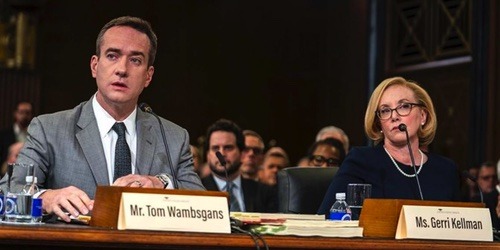
Over the last few years, Americans have made Congressional hearings they're own sort of perverse reality show. So, it's no surprise that "Succession" would go there and put members of the Roy family on display and under scrutiny. The main targets here are Tom (Matthew Macfadyen) and Cousin Greg (Nicholas Braun), who have to answer a number of questions about Waystar Royco's handling of alleged sexual assaults and crimes involving the company's cruise line. "Succession" had been building up to this moment since early Season 1 and the payoff is both cringe-worthy and hilarious.
04. “The Great War and Modern Memory,” True Detective Season 3 HBO
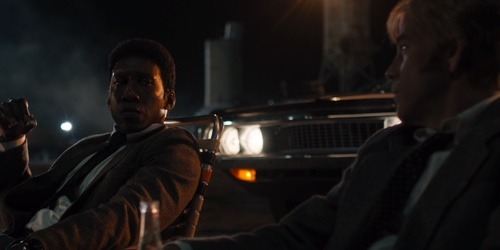
Filmmaker Jeremy Saulnier's ("Green Room," "Hold the Dark") crack at a TV show is nothing short of spectacular. With "The Great War and Modern Memory," he establishes an unsettling mood and tone to the third installment of "True Detective," a somber story about two cops investigating the disappearance of two young children over the span of several decades. The episode is poetic and solemn, featuring two mind-blowing performances from its stars Mahershala Ali and a career-best Stephen Dorff. They're both in tune with what kind of show they're in, selling creator Nic Pizzolatto's writing, which coming out of the mouths of other performers would likely sound dreadful.
03. “Episode 1,” Fleabag Season 2, Amazon
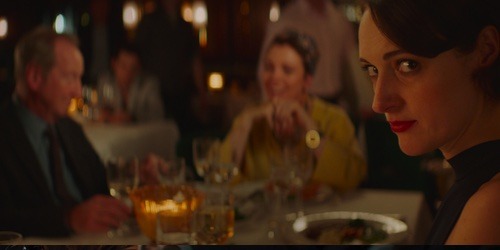
Filming a dinner scene is not as easy as it looks. For the first episode of the second season of the outstanding "Fleabag" both writer/creator/star Phoebe Waller-Bridge and director Harry Bradbeer hit out of the park. It's a whirlwind of an episode where PWB's Fleabag character literally tells the audience Season 2 is a love story, which, of course, involves the so-called Hot Priest (Andrew Scott). "Episode 1" is fast, zippy, and manages to get most of the show's cast in one room, featuring wonderful performances from not only PWB and Scott but also Olivia Coleman, Sian Clifford and Brett Gelman. It's a chaotic half-hour of TV that has a kinetic energy unlike anything else this year, taking an awkward family dinner to its limits.
02. "Series Finale Part 2: Hello, Elliot,” Mr. Robot Season 4, USA

The series finale of “Mr. Robot” is as emotional as it is shocking. Sam Esmail sticks the landing with his hacking drama, turning a story about a vigilante and his crew trying to right the wrong world into a personal journey of a young man struggling with deep trauma. It’s a beautiful sendoff, that is fully satisfying and a magnificent accomplishment of modern television.
01. “Never Knew a Love Like this Before,” Pose Season 2, FX
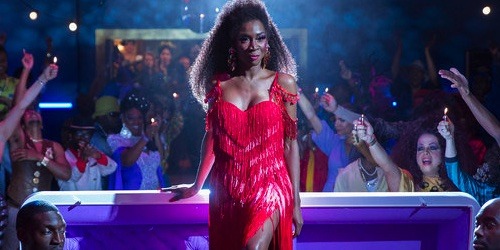
"Pose" proved itself to be an uplifting and hopeful show, uprooting cliched and tragic stories about trans people we've come to see on screen and instead, opts to show us something beautiful. But its "Never Knew a Love Like This Before" that is 2019's best episode of the year — a heart-wrenching and unexpected boom and a reminder that trans people, especially trans women of color, are often in danger. Here, Candy (an out-of-this-world performance from Angelica Ross), who orbited around the main cast in the series, is murdered. She returns to her funeral in spirit, having in-depth conversations with her friends, enemies and frenemies. Pray Tell (Billy Porter) honors her by moving forward with her wish — a lip-synch category for the balls that he previously rejected. It's a beautiful story about the history of queer culture that's personalized in an unexpected way.
#tv#best of 2019#best tv#black mirror#striking vipers#lgbt#lgbtq#the other two#comedy central#netflix#killing eve#bbc america#undone#amazon#the deuce#hbo#james franco#the mandolorian#baby yoda#ramy#hulu#pose#better things#fx#pamela adlon#the oa#brit marling#servant#apple#apple tv
65 notes
·
View notes
Text
So, the Avengers: Endgame spoiler ban is lifted, and I’ve had a chance to mull over my responses, so I’m finally going to try to write up some thoughts. I was hoping to have seen it again in the interim, but that didn’t work out, so I’m relying on memory from one viewing – it’s possible I’ve missed or misinterpreted things.
Spoilers to follow, so scroll carefully, Ye on Mobile! Also, sorry about the Long Post (TM), I apparently I had a lot to say.
Time-wise, for its 3 hour length, the film didn’t feel long to me. It maintained its momentum and nothing felt laggy or tedious, even the big battles.
Time travel-wise… Okay, positive stuff first. I thought that revisiting the settings of earlier films was absolutely delightful and nostalgic. It felt very satisfying to have those call backs to earlier adventures and cameos of old enemies (Crossbones, Pierce, Zola, and, surprise, even Sitwell). The Cap vs. Cap fight was hilarious, and I loved seeing Steve so utterly exasperated with himself (“I can do this all d-“, “YEAH, I know.”). The scene in the 70’s was good, though some of the Tony and Howard stuff rang a little hollow to me. I think that’s mostly because I’ve always had trouble reconciling Dominic Cooper’s Young Howard Stark (who I’m very fond of, especially after Agent Carter) to the older version of Howard we see in various flashbacks. They look, sound, and act nothing alike; my friends and I always joke that Hydra replaced Howard sometime in the 60’s. So while an aged up Dominic Cooper Howard probably would’ve made me emotional, as it was, I was more moved to see 20 seconds of Jarvis than for all the stuff with Tony talking to his dad about fatherhood.
Using the “Quantum Realm” for time travel was… okay…. Insofar as the “science” of the Ant-Man films has absolutely never made any damn sense (and that’s …. fine. They’re funny and joyful, and I enjoy them a lot anyway. I don’t go to Marvel movies for “realistic” science fiction), throwing time travel into the mix felt like it just might as well happen. I guess I understand why they chose to go with the “nothing we do in the past can affect our own timelines” approach, but frankly it’s still giving me a headache. I also understand not over-explaining, but there’s a middle ground there that wasn’t quite achieved for me. I guess, based on the scene with Tilda Swinton (sorry, haven’t seen Dr. Strange and don’t know her character’s name) and Bruce, we’re supposed to assume that every journey to the past (cue Anastasia music) creates or perhaps just shifts the time traveler into an alternate reality that branches from their original reality at that point? And then when they travel back to the time they started from via the quantum realm, they return to their original version of reality. So the actions that they take in the past affect that alternate reality, but not the reality that they came from and return to. That’s the only thing I can figure out that makes sense to me at all, but unfortunately the film didn’t make that especially clear. Maybe seeing it again would clarify? So this is gonna be a big factor in how I feel about Steve’s ending, but I’ll get to that in a moment.
Also, a tangent re: time travel… While Tony (an engineer) and Bruce (a biologist) are both brilliant, this seems a little outside their areas of expertise! You know, wouldn’t it be great if we had a character who was an astrophysicist who could really tackle this type of thing - OH HEY, we do! I realize that there were probably issues with getting Natalie Portman back in a substantial role, but I love Jane Foster a lot and I would’ve loved seeing her work with Tony and Bruce to save the universe with a handful of Pym Particles.
OKAY, there’s an awful lot to cover, so I’m going to break down some of my feelings by character just to try to stay organized.
(First, a disclaimer that I haven’t seen Captain Marvel yet, so while Carol seemed like a great character, I don’t have a lot to say since I don’t really know her yet. That said, this seemed like an adequate introduction to the character and I am interested to know more. We have the problem of “if Fury could’ve called her anytime why didn’t he call her during the Chitauri attack/to fight Ultron/etc.” But all the individual titles that come after the team-ups have that problem a little bit… Where were the Other Avengers in Thor 2 or Iron-Man 3, etc.? Sometimes you just have to accept and move on.)
Briefly:
Nebula and Gamora, Tony, Bruce, Scott, with a quick note about Wanda and a very conspicuous absence
And the heavier stuff regarding:
Thor, Natasha, and Steve (and Sam and Bucky).
Nebula and Gamora:
While the Guardians aren’t really my thing, I did vaguely know that in the original Infinity Gauntlet comic storyline, Nebula takes the gauntlet from Thanos and fixes reality. I understand not following the comics exactly for the sake of surprise and to fit with the changed version of the universe, but it still felt wrong to totally take that away from her. Especially given what Thanos has done to her, personally, it seemed fitting that she was going to be the one defeat him. I’m glad she was still pivotal to the story, but it felt like an extra kick in the teeth that past!Nebula was the catalyst for Thanos catching up with our heroes rather than getting to be the one who saves the universe. And forcing her to kill her past self felt like it should’ve been treated with much more gravity than it finally was.
I’m really glad we “saved” Gamora by bringing the version of her from the past into the current timeline (however that works), but I feel so bad for anyone who’s really invested in Gamora/Peter Quill. It’s so heartbreaking that their entire history never happened as far as she’s concerned, that we’ve not only removed that very key relationship, but her character growth over the past how many years. It is at least hopeful; Peter remembers, and has the chance to woo her again, but that’s still got to sting.
Tony:
So Tony Stark sure did die.
I’m not sure… he really needed to? I mean I don’t think I get the rationale of the Infinity Gauntlet killing/maiming the user. I recall the handwavey line about gamma radiation, but if you don’t immediately die after using it, couldn’t you juuuust, say, use the Reality Stone to be like, “hey what if I wasn’t mortally injured”? Couldn’t somebody ELSE do that? I’m not sure I get that.
So that said, I’m not sure if RDJ was really pushing for “you gotta kill me off” for dramatic effect or just to step out of the franchise? It would’ve been kinda cool to see retired Tony working as Avenger-support, working on suits for Rhodey and future Iron-heroes (Iron Patriot? Iron Heart?), mentoring Peter and other youths, and living his nice life with Pepper and their munchkin.
But what a way to go, huh? Dramatic self-sacrifice saving the the planet(/universe?), and a funeral that almost everybody who’s anybody shows up for.
Bruce:
I’m with Valkyrie that I preferred EITHER version to PermaHulk Bruce. Honestly, the Hulk himself had sort of become an independent character, especially after Ragnarok (my issues with Ragnarok aside). So by Bruce settling into this “I look like the Hulk but I act like Bruce” limbo, are we … essentially killing the Other Guy? I don’t like that. I mean I prefer Bruce obviously, but I’m really uncomfortable with that solution.
Scott:
I really love Scott and he was delightful as always in this film. I’m heartbroken for him that he missed (another) 5 years of Cassie’s life, though. I’m also pretty sad we won’t get to see the little girl who has played Cassie so far in any future films since we’ve aged the character up to a teenager. Also, I would’ve liked to see more of Hope! I loved Scott and Hope’s little moment when Hope calls Steve “Cap” and they trade expressions between Scott going “SEE, HE IS REALLY COOL, RIGHT?” and Hope being like “Yeah, okay”.
Overall I guess the Ant-Fam is sorta tangential to the main MCU Avengers cast, so while it was nice to have everybody play together, briefly, I’m pretty content that we’ll see more of Hope (and Janet!) in future Ant-Man/Wasp titles.
- Similarly, while T’Challa and the Wakanda fam were definitely underused in Endgame (especially the entirely absent Nakia), Black Panther 2 is happening. It’s disappointing to not get a substantial amount of characters that you like in the big team-up films, but it’s good to know they’ll be returning later.
Wanda:
We are really leaving Wanda in a rough place of having lost her twin brother and her android boyfriend within a pretty short amount of time (that’s rough, buddy). Plus, one of the characters that we’ve seen her have a pretty strong bond with is Steve, and he’s out of the picture too. I’m not sure where we’re going with this character, honestly. Hopefully it’s not continuing to hurt her.
It really seemed conspicuous that nobody so much as mentioned Vision by name in this film. Wanda referred to him indirectly, but that was it. I get that Vision isn’t immediately able to be saved since he didn’t vanish in the Gauntlet event, but, yikes, can anybody besides Wanda please attempt to give a damn about him?
I know sometimes we like to pretend that Age of Ultron didn’t happen to us, but Vision was still an interesting character, and some major plot points of Infinity War focused on the value of Vision as a person. I feel pretty bereft that he’s (apparently) gone beyond recall with so little mourning.
Thor:
*heavy sigh*
Thor’s characterization was….???
Unpopular Opinion: despite its good points, I overall didn’t really like Ragnarok, and Thor already sort of felt out of character to me at that point.
Another Unpopular Opinion: I actually really love The Dark World. Thor’s relationship with Jane, and his characterization of gentleness and humility in that era really were important to me.
And I get that Hemsworth is genuinely good at comedy and probably likes doing it. But Thor has always been a funny character. We just used to be laughing with him instead of at him.
I was so uncomfortable with the way the film framed Thor’s brush with depression and alcoholism. Because Thor has lost so much at this point, he has every reason to struggle. I want to say that Thor wouldn’t have given up, but the same time I can believe that this almost unimaginable weight of loss (Frigga, Odin, Loki, Heimdall, The Warriors Three, Asgard itself) would take some toll. And yet the framing of his scenes treats his grief and despair as cause for humor. We’re expected to laugh about an unkempt beard and a big belly instead of being concerned about the fact that a character that we loved considers himself a failure. And there’s nothing funny about this situation to me. It just made me uncomfortable and sad. Revisiting Thor 2 and having him talk to Frigga was on the better side, but I’m disappointed that we couldn’t save her.
Natasha:
*heavier sigh*
Okay, I think a lot of the problem here is that it’s just really difficult to kill a main character any time other than in the last act (we also saw this problem in Star Wars Rebels, but that’s another can of worms). So because Natasha died at such a midway point in the movie, I still can’t shake the feeling that she’s not really dead. Nothing about it felt final to me. Clint trying to emphasize that, because Red Skull said so, it was impossible to bring her back (it’s freaking RED SKULL, why would we trust him???) just made me think even more that she was definitely coming back. Everything seemed to point to her dramatic reappearance and then it just … didn’t happen. That’s not to say it won’t happen in a future film, though, but it still feels deeply unsatisfying and unceremonious now, and that feeling really was a blow to my overall enjoyment of the film.
It also sat really badly with me that Natasha made this choice not just to save Clint (which I would believe; their friendship is really great and I love seeing Natasha’s extremely profound but non-romantic bonds with Clint and with Steve (though I would’ve preferred Natasha/Clint to Natasha/Bruce)), but because she fundamentally felt less worthy than Clint. I don’t like the idea that Natasha went to her death still feeling such guilt, still feeling like a monster (according to that awful scene in AoU), for the things she did as a very young person under the influence of brainwashing. I don’t like that at all.
I’m also really disappointed that we didn’t pursue Natasha and Bucky’s relationship from the comics in the MCU. Because the idea of two people with very similar emotional wounds coming together to support each other as they heal is just really appealing (#looking for baggage that goes with mine). That throwaway line in Civil War (“at least you could recognize me”) really had me convinced that we were going there. I guess we still could, but there are a lot of “ifs” standing in the way now.
Steve:
Another disclaimer: Steve is absolutely my favorite Avenger, and I ship Steve/Peggy really hard.
Aaand I still felt uncomfortable with the resolution.
Maybe it’s just the difficulty I’ve been having getting my head around the time travel shenanigans.
So a lot of the criticisms I’ve heard/read about Steve going back to the 1940’s to Peggy seems to be functioning under the assumption that Steve is living within the timeline as we know it in MCU canon, staying completely hidden, and just not changing any of the bad things that canonically happen: Bucky becoming the Winter Soldier, Hydra infiltrating SHIELD, etc.
But we’ve been told that time travel doesn’t work that way – that Back To The Future, Doctor Who way – in this universe, right? This brings me back to my Alternate Reality take. So my understanding is that after Steve returns the infinity stones to the points in time that the Avengers yoinked them from, he basically occupies an Alternate Reality for a lifetime (Tilda Swinton’s thing about the branched off timelines being consumed by the ~forces of darkness~ only applies IF the infinity stones aren’t returned, and he took care of that). And he could’ve done anything in that Alternate Reality – married Peggy, saved Bucky from Hydra, prevented any wars and disasters he could. Basically it was Steve’s own personal Happiness AU. And then, (presumably after Peggy’s death), he uses the Pym particles and the Quantum Realm to return to his original reality.
Except, in that case, shouldn’t he have returned on the platform instead of dramatically showing up on that park bench?
So…I’m confused and I don’t like it.
Even from the Alternate Reality take, the situation of that choice is complicated. In choosing to be with Peggy, he’s tearing himself out of the lives of all of his loved ones in his Original Reality – Bucky, Sam, Wanda, (whatever the situation was with Sharon Carter that we absolutely never resolved?), etc.
And we’re not completely sure it was a choice, exactly. It’s possible that in the ongoing work to return the infinity stones, Steve somehow got trapped in the past (don’t know why he would’ve had to go to the 40’s, but I guess he could’ve run out of Pym particles there and had to wait for Hank to invent them to even be able to make the trip back).
Also, narratively speaking, it feels a little like we’re invalidating Peggy’s grief, and her character growth that went on in Agent Carter (even if her happy ending with Steve is going on in an Alternate Reality). I wasn’t totally sold on Peggy and Daniel Sousa yet (though I do like Daniel as a character a lot), but Peggy had a whole lifetime that didn’t involve Steve except as a beloved memory. Where is she in that arc when Time Traveler Steve comes back into her life?
Also, even if it IS an Alternate Reality, there would STILL be a version of Steve frozen in the ice in the 1940’s in that reality. How do we deal with that?
And how do we deal with the fact that Steve isn’t the man that Peggy lost anymore. He still loves her, but he’s changed, he’s lived almost a decade since then. How do they find their footing with each other? I’m sure it isn’t impossible, but it’s interesting, and it’s not addressed at all.
I think that’s what bothers me the most – that this is a whole huge adventure – Steve’s entire LIFE – that we’re shoehorning in at the very end of the movie without showing any of the really interesting bits or answering any of our questions about it. I guess that leaves the situation as a fertile ground for the imagination, and maybe that’s a space that the MCU intends to explore someday? I would absolutely watch the hell out of Steve’s Time Travel Romance with Peggy, somebody take my goddamn money.
Anyway, I’m happy about Sam taking up the Shield as Captain America. Bucky-Cap also could’ve been great, but I feel like, with the place we left Bucky in his recovery, he doesn’t need that responsibility yet. Let him rest. Wherever we’re going with the series featuring Sam and Bucky is going to be really interesting, and maybe we’ll get to the point where Bucky really wants to work towards atonement and is ready to share the burden of the Shield with Sam? I’m looking forward to finding out.
Overall, most of my feelings about the movie were pretty positive. It was a complicated story to tell with a lot of characters, and mostly it was handled pretty well. Some of those threads did fall flat for me, but they didn’t totally invalidate the parts of the movie that worked.
#spoilers#Avengers Endgame spoilers#Endgame spoilers#long post#I had in my outline that I was going to talk about Clint#but I accidentally skipped that#it's briefly in Natasha's section#I could go into it more but this is already too long
18 notes
·
View notes
Text
So 11.08. This episode just hurts for the Sam flashbacks, but everything that never had a chance to really be addressed by s11′s “Save The Universe First, Fix Our Personal Crap Later” mission seems to be coming back around in s12 on a FAR more personal-to-Sam-and-Dean level.
Since I’m currently actively trying to distract myself from 11.09... I thought I’d pull some of the lines from 11.08, because we seemed to be discussing a lot of these points now after 12.15 (see this post by @k-vichan for reference purposes too).
Granted, due to the “flashback to his childhood” nature of most of these quotes, this is largely going to focus on Sam’s side of this issue, but I’ll try to balance this out with comments about Dean’s side.
In the first flashback we see 9-year-old Sam alone in a motel room while Dean and John are out hunting. Dean had apparently been trying to “work on John” (hello Sam trying to “work on Dean” in 12.14...) to let Sam join their hunt. Over the phone, Dean tells him John said no.
YOUNG SAM : No fair. You started hunting when you were younger than me. YOUNG DEAN : Yeah, well, I never had an imaginary friend.
In the context of the scene, having an imaginary friend seems to be Dean’s way of saying that Sam’s not “grown up” enough to participate on the hunt, but on a meta level, it’s actually saying something a little different.
Unlike Dean, Sam had been “sheltered” enough from HAVING to “grow up” enough to hunt at that age. He was ALLOWED to have an imaginary friend, this luxury of childhood that Dean never had.
I still remember folks wondering when this first aired if Dean really HAD asked John to bring Sam along, or if Dean had been the one trying to keep Sam safely tucked away in an ugly motel room... Because we know Dean has always been the one trying to let Sam be a kid. I mean, in 3.03 when they find John’s secret storage unit, Dean finds his first sawed off shotgun, and Sam finds a soccer trophy. THESE TWO HAD VERY DIFFERENT CHILDHOODS. And we’re told repeatedly throughout the series that the difference was that nobody was looking out for Dean the way Dean looked out for Sam.
In the next flashback, we see Sam and Sully imagining wild things. Ever wish you could fly? Or eat 10 waffles in one sitting?
(and oh god, WAFFLES. Waffles are the innocent, childlike version of El Sol. Deception and daydreams. In 12.11 we saw DEAN doing his best to “eat 10 waffles” when he was losing his memories. But in 11.08 Sully said he’d tried it once and he made gagging sounds to describe the effects. But I think the parallel here between Sam’s wishes when he was 9 and the way Dean was behaving in 12.11 are striking and important. I’ll bring this up again later... probably in another parenthetical digression...)
After the waffle mention, Sam gets far more serious, bringing up something that we’ve known was in Sam’s nature since the pilot episode:
YOUNG SAM : Ever think... about running away? SULLY : From you? No way. YOUNG SAM : No, I mean – from here. All this. The hunting life. SULLY : Do you? (Young Sam nods.) SULLY : Hm. Ever think, that maybe you wanna go to school? Make some friends? YOUNG SAM : But I have you. SULLY : Yeah, you do. But one day you won’t. Sam, I want you to listen to me. You can be whatever you wanna be. You’re not Dean, you’re not your dad. You’re Sam. And Sam is so awesome. YOUNG SAM: Can you imagine, running away? My dad would KILL me. SULLY : Well... It���s your choice, Sam. It’s your life, I mean, it’s all up to you.
Sam has ALWAYS wanted to run away from the hunting life. Unlike Dean, Sam HAD TIME AND SPACE to really consider that it might actually be a possibility. But, when Sam’s JUST ABOUT TO LEAVE WITH SULLY, to run away, John calls and tells Sam to catch the next bus to Milwaukee.
(for some reason, my mind has created a horrible scenario of what happened on John and Dean’s end... that Dean continued arguing to keep Sam out of the hunt, but John finally snapped and was like no let’s get this 9-year-old on a bus to come meet up with us because he’s old enough to be useful to us now... and eeesh...)
But at that invitation to rejoin the family (THE FAMILY, not hunting itself, but just to be welcomed into the FAMILY), Sam’s more than ready to “unmake up Sully:”
YOUNG SAM : I’m a Winchester. I hunt monsters. Why would I want anything else? SULLY : Well, I – I’m not sure it’s you. YOUNG SAM : Why can’t you be happy for me, Sully? SULLY : Listen, buddy – I’m just afraid you’re going down a path you might be better off not going down. YOUNG SAM : Yeah, but I’m not afraid. SULLY : I know you’re not. You’re one of the bravest kids I know! It’s just... this whole hunting thing, you know, it’s not the only way. There are so many other ways. And you can find one, Sam. You can leave, right now. YOUNG SAM : I don’t want another way. I wanna be with my dad and... and Dean. SULLY : Look, Sam, I’m just saying this ’cause I’m your friend. YOUNG SAM : Pretend friend! You’re not even real.
THAT is what Sam wants. He wants to be with his family, but he’s absolutely convinced that the only way to do that is to do and be what his family is:
I’m a Winchester. I hunt monsters.
As of those two things are one and the same. Winchester = monster hunter.
And I think THIS is Sam’s current stumbling block as everything stands at the end of 12.15. THIS is why he signed on to the BMoL Monster Genocide Program.
He’s just seen Dean lose all his memories of hunting, all his memories of how awful huge chunks of their lives really was, AND SAM BELIEVED THAT DEAN SEEMED HAPPY WITHOUT THAT KNOWLEDGE. That Dean was happy BECAUSE he couldn’t remember all of that. Sam didn’t seem to understand:
SAM: This is crazy. DEAN: What? SAM: Me giving you "the talk." You know how many times we've had to tell some civilian that monsters are real? DEAN: Yeah, but monsters are real. And we're the guys that kill 'em, man. I mean, come on. Best job ever. SAM: Yeah. If you like greasy diner food, crappy motel rooms, more than one Apocalypse. DEAN: I don' t know. We kinda sound like heroes to me.
(oh, and Dean’s favorite part of all of this? DEAN: And our best friend's an angel. What?! )
Because in that last scene of 12.11, they’re talking at cross purposes, and neither of them seems to recognize the fact:
SAM: No, just, you know... some of the things we've done, we've had this weight for... forever. And seeing it gone, uh, you looked happy. DEAN: Huh. Well, look, was it nice to drop our baggage? Yeah, maybe. Hell, probably. But it wasn't just the crap that got lost. I mean, it was everything. It was us, it was what we do, you know? All of it. So... that's what being happy looks like? I think I'll pass.
To Sam, the crap IS the hunting, is the terrible life of bad food and crappy motel rooms and multiple apocalypses... but to Dean the crap is the sort of stuff that happened in this episode, where one of them is in danger. the rest of it... that’s the best job ever, in Dean’s estimation.
Sam tolerates “the job” because of family, because he believes he can’t have one without the other, despite his deepest wish being just that-- to do ANYTHING other than join the family business, without losing his entire family in the process.
by the end of 11.08, we get our Main Theme for the rest of s11, which is still a main theme of s12:
DEAN : We’ll find another way. Okay? There’s always another way. SAM : Okay. Then tell me – what is the other way?
Dean found “another way” to deal with the Darkness, with honesty and words and finally getting to the root of her sibling drama with Chuck.
And Dean’s STILL trying to find other ways via honestly talking with Sam. Sam, meanwhile, has unilaterally decided that maybe the MoL have a point... if he can just get rid of all the monsters, he could have his family without having to suffer through the hunting part. And he seems to think that undertaking genocide with the MoL’s resources to back him up is a reasonable way to go about this. >.>
So Sam tries to “work on Dean,” to wear him down with hunt after hunt after hunt, I think partly just waiting for Dean to get to the point where he shouts ENOUGH ALREADY I NEED A BREAK.
But Dean... doesn’t. He falls right into that “purity” of Purgatory where nothing matters BUT the hunts. He’s perfectly content to keep it up as long as Sam keeps throwing hunts his way, even to the point where Sam has to call a halt to take a breather and demand Dean stop long enough to at least shower, i.e. take care of himself.
And now my rewatch has progressed as far as 11.11, and it seems an apt parallel to draw between what 9-year-old Sam wanted out of life, and what Dean without his memories and essentially reverted back to a childlike state wanted out of life. That ^^ is the childish view looking forward, but from 11.11-- set in a retirement home-- this is a very “adult” and rational perspective on what their respective endgames should really be,
FOLLOW YOUR HEART.
And Sam and Dean’s respective “hearts” both lie firmly rooted in family, but that doesn’t necessarily have to mean they must always hunt together in order to BE family to each other.
Sam’s chat with Eileen about what she would do with herself now that she finally got her revenge, she said she considered following in her mother’s footsteps to become a lawyer-- BUT HER MOTHER ALSO WAS SHOWN TO KNOW THE SPELL THAT BANISHED THE BANSHEE. Her mother might’ve been a lawyer, but as a legacy of the Men of Letters, she was clearly more than just a lawyer. In that same way, Sam could be so much more, too.
(woo woo fingers about witch!Sam as a NEW era Man of Letters, maybe with Eileen at his side being awesome together)
SAM: You were right, by the way. Getting back on the job, it... It helped. DEAN: Wait. Say that again. The -- that part about me being right.
I don’t think Sam would truly be any happier than Dean if everything their family has always been were suddenly ~wiped off the planet~. But he needs to find a way to come at it in his own terms, and not anybody else’s. Not Mary’s, not John’s, not Dean’s...
As for Dean, though:
MILDRED: So you boys hitting the road, huh? DEAN: Yes, ma'am. MILDRED: Well, it's for the best. It wouldn't have worked out between us anyway. DEAN [smiling] Why not? MILDRED [chuckling and turning towards Dean] Darlin'... If there's one thing I've learned in all my years on the road, it's when somebody's pining for somebody else. [Dean smirks] Oh, don't try and hide it now. Follow your heart. Remember?
Mary being back in the picture presents a wild card to their usual family dynamic here, because Sam and Dean are both trying to come to terms with what that means for their concept of family.
Here, have a few lines from 11.12 to sum up my thoughts on this:
JODY: You know I've got nothing against hunting. But if she's hiding in it, because she doesn't have anything else? I'm just - worried about her being so alone.
but...
SAM: You wouldn't be the first hunter who is trying to escape something. [...] CLAIRE: Maybe it's time I just head out on my own. And be a full-fledged hunter. SAM: Claire. I absolutely understand the need to hunt. Believe me. I do. But the monsters are always going to be there. On and on. Forever. But a chance at a family? At a home? School? That won't be.
At the end of 11.12, Jody, Claire and Alex reconfirmed their little “family unit” despite the fact that each of them had chosen a different road to travel down going forward. BUT THAT DIDN’T MAKE THEM ANY LESS OF A FAMILY UNIT.
Jody has one foot in hunting and one foot in law enforcement. Alex wants to go to school and do something “normal” with her life. Claire wants to get REAL training to become a better hunter. They don’t ALL have to live identical lives and have identical goals and interests in order to BE family to each other.
Winchesters: take a memo, please.
#spn 11.08#spn 12.11#spn 12.15#winchester family dynamics#breaking the codependency#sam fucking winchester#the rashomon effect
86 notes
·
View notes
Text

Ross grew up in a military environment with both his father and paternal grandfather in the military.[4]
Ross is the Air Force general in charge of Bruce Banner's gamma bomb project. His daughter, Betty, takes a liking to the young scientist, deepening Ross' dislike for the "weakling". After Banner's transformation into the Hulk, Ross spends years chasing the monster, becoming obsessed enough to commit treason by allying himself with the Leader, MODOK, and the Abomination[5] to destroy the Hulk. Dismissed from the military, he shows up at Betty and Bruce's wedding with a gun and shoots Rick Jones. He is recruited by S.H.I.E.L.D. agent Clay Quartermain to merge with the electric creature Zzzax, a process that gives Ross superpowers but also makes him mentally unstable. He is later restored to human form but retains some residual energy-generating powers.[6]
Finally, the Nevermind, a mutant who drains people of their life energy, attacks Gamma Base in search of a strong host, in this case the Hulk. After witnessing Banner and Rick Jones (who was the Hulk at that time) heroically engaging the mutant, Ross realizes that he has been wrong about the Hulk being a mindless monster. He saves his daughter by allowing the mutant to latch on him and discharging the energy resources he retained from Zzzax. Giving his blessing to Bruce and Betty, he dies in his daughter's arms.[7]
Ross' body is later stolen by the Leader, who uses the powers of one of his followers to resurrect Ross. He turns him into a mindless replacement for his fallen soldier Redeemer. Ross is eventually recovered and revived by agents of the alien Troyjan and returns to the Air Force. He later comes up with a more cost-effective method of confronting the Hulk when he is in his childlike stage: active non-resistance. He and his men simply do not fire on or engage the Hulk in any way. The Hulk, confused, does not smash and leaps away.[volume & issue needed]
Ross would make friends with Banner, but when Betty is seemingly killed due to what both Ross and Banner believed to have been Banner's gamma-irradiated DNA interacting with hers, he once more pursues the Hulk with a vendetta.[volume & issue needed]
Around this time, General Ryker takes over the pursuit of the Hulk. Ross is indirectly involved, observing when Ryker mentally tortures Banner to try to figure out how the Hulk works. The Hulk escapes from Ryker's control and, after several adventures, is lost in space.[volume & issue needed]
After the Hulk returns from exile and initiates "World War Hulk", General Ross, now a full general, makes his own return, electing to bring the fight to his nemesis once more after the Hulk beats Iron Man. After a failed assault on the Hulk, Ross and his men are captured and placed in chains under the watch of Hulk's Warbound, the army he has brought back from space. The Hulk is eventually defeated via satellite weapons that revert him to human form.[8]
Military branchEdit
Ross' military affiliation has been inconsistently portrayed in the comics. Many early Hulk stories depicted Ross as an Army general trying to capture or destroy the Hulk with a U.S. Army battalion called the "Hulkbusters". However, he is also frequently seen in an Air Force uniform, as in his first appearance in Incredible Hulk #1. Stories about his service during World War II portray him as an Army officer in the U.S. Army Air Corps, as the Air Force was not a separate branch of the Armed Forces until September 18, 1947. In a November 2010 Q&A column, then-Marvel editor-in-chief Joe Quesada clarified that Ross is a member of the U.S. Air Force and that inconsistencies in his uniform can be explained via the artistic license with which artists attempt to present a more dramatic-looking uniform, and that Ross may be a part of a special unit of the U.S. Air Force, or the Marvel Universe's version of it, which has its own unique dress code.[9]
The Army continuity is also followed in various Hulk adaptations, such as in the 1966 and 1996–1998 cartoon versions of the Hulk, the 2003 Ang Lee movie Hulk in which he is portrayed by Sam Elliott, and in the 2008 movie The Incredible Hulk, in which he is portrayed by William Hurt. The Official Handbook of the Marvel Universe: Hulk 2004 issue officially indicates Ross to be a three-star lieutenant general in the U.S. Air Force.
Red HulkEdit

Red Hulk as seen on the cover of Hulk (vol. 2) #1 (January 2008), art by Ed McGuinness
Red Hulk (also known as Rulk[10] or The IncREDible Hulk) was introduced in 2008 in Hulk (vol. 2) #1.[11] The Red Hulk was created to be an uninhibited, tactically intelligent adversary to the Hulk.[12][13] Although Kenneth Johnson, the creator of the 1970s TV series The Incredible Hulk, had suggested a red Hulk for that adaptation decades earlier,[14] Marvel editor-in-chief Joe Quesada proposed the idea for the comics to debut a red version of the character whose human identity was a secret.[15] Initially, Red Hulk's identity was unknown both to the characters in the story[16] and to the reading audience.[17]
The opening story arc of the Hulk (vol. 2) series that premiered in 2008 established that the Red Hulk is very aggressive, as he murders the Hulk adversaries Wendigo and Abomination; destroys the Helicarrier of the spy organization S.H.I.E.L.D.; defeats several Marvel heroes; and, after causing an earthquake in San Francisco, is finally defeated by the combined efforts of the Hulk and Thor. In a subsequent storyline, the Collector places the character with other villains on a team called the Offenders, an evil version of the Defenders, in a bid to prevent the original Hulk from reuniting with Jarella.[18] In that story, Red Hulk siphons the Power Cosmic from the Silver Surfer, seemingly killing him, steals his board along with Terrax's cosmic ax, and uses the power to go on a killing spree, killing Namor, Tiger Shark, Dr. Strange, Baron Mordo, the Grandmaster, Terrax, a time-displaced Hulk, and Psycho Man. However, when Red Hulk reveals this to Galactus, Galactus swiftly takes back the Power Cosmic from him. Subsequently, almost everyone he killed is brought back to life with no memory of the event.[19]
The Red Hulk was created as part of a Super Soldier program by several persons, including Doc Samson,[20] and the criminal think tank Intelligencia,[21] headed by MODOK.[22] The 2009 "Code Red" story arc[16] also made allusions to Red Hulk's real identity, and introduced a Red She-Hulk character, when Domino identifies Red Hulk before his transformation.[23]
In the 2010 storyline "Fall of the Hulks: Gamma", Red Hulk is related in flashback to have killed General Ross at the behest of Bruce Banner, with whom he has formed an alliance.[24] However, the 2010 "World War Hulks" storyline reveals that Red Hulk is Thunderbolt Ross himself, the Red She-Hulk his daughter Betty, and that the Ross who was "killed" was a Life Model Decoy used to convince the world that he had died. Red Hulk then thwarts the Intelligencia's plan to take over the United States with a Life Model Decoy of Glenn Talbot by destroying the Talbot LMD and attempts to take over the country himself.[8] He is thwarted by a restored Hulk, who beats Red Hulk mostly due to Red Hulk's exhaustion from overheating. Hulk tells Red Hulk that it was his idea to fake Ross' death and that he can never again resume that identity. After imprisoning Red Hulk in the Gamma Base, Banner makes arrangements with Steve Rogers for Red Hulk to join the Avengers.[25][26]
After Steve Rogers recruits Red Hulk, Red Hulk manages to stop Intelligencia's failsafe plan "Scorched Earth". Although Banner had claimed that he removed Red Hulk's energy-draining ability from him because it was killing Red Hulk, Red Hulk is shown to still possess this ability.[27] After the events of the Scorched Earth program, Red Hulk is paired up with a Life Model Decoy named Annie. Red Hulk is occasionally assaulted by Ross' former protégé General Reginald Fortean, a scientist given superhuman mutations by MODOK named Zero/One, and the Indian serial killer Black Fog .[28]
Red Hulk plays a vital role in the Infinity Gem crisis of the "Heroic Age" storyline.[29] During the 2011 "Fear Itself" storyline, Red Hulk attempts unsuccessfully to stop the Thing (in the form of Angrir, Breaker of Souls) from destroying the Avengers Tower,[30] as MODOK Superior and Black Fog converge on both combatants during the fight. Angrir dispatches Red Hulk by knocking him out of the city and into Vermont.[31]
As part of the 2012 Marvel NOW! relaunch, Red Hulk leads a non-government sponsored version of the Thunderbolts.[3] This incarnation is a strike team that cleans up the messes left by Ross' military career, but the team later decides on a new arrangement in which the team will do one mission for Ross, then a mission for a random member.[citation needed]
After Hulk takes away the powers of Rick Jones, Skaar and Betty Ross, Ross starts monitoring Hulk's movements. This leads to a battle in which Doc Green subdues Red Hulk and injects him with a formula that reverts him to Ross. The Army is alerted to the confrontation. When they arrive, the Army arrests Ross for deserting his country.[32]
The 2016 "Civil War II" storyline reveals that Thunderbolt Ross is incarcerated in a classified military prison.[33]
In 2018's Free Comic Book Day Captain America issue indicates that Ross is no longer incarcerated.[34] Subsequently, in that year's Captain America #1, it is revealed that Ross was paroled for helping a resistance cell during the "Secret Empire" storyline and appointed head of the investigation into the attack.[35] However, he was later killed, and Captain America was framed for his murder.
1 note
·
View note